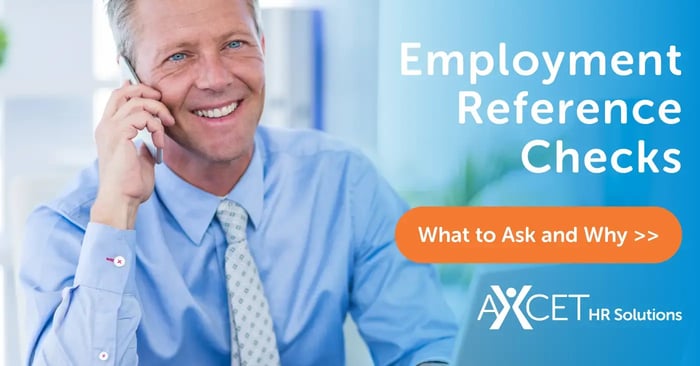By
Jeanette Coleman, SPHR & SHRM-SCP
on
Aug
05,
2025
5 min read
2 Comments

Verifying Employment Calls the Right Way
If you’ve ever answered a phone call asking to confirm a former employee’s job title or start date, you’ve already done an employment verification check. But these requests—while seemingly routine—can carry legal risk, affect your company’s reputation and create compliance challenges if not handled properly.
Understanding how to verify employment and what you are legally allowed to share is essential. Whether you're responding to a mortgage lender, a background screening company or another employer, your response should be accurate, consistent and legally compliant.
This guide explains what information you can share, what to avoid, how to protect your business, and how to develop an internal policy aligned with current employment verification laws.
RELATED: No Smoke Screens - Prescreening Helps Ensure Good Hires >>
An employment verification check is a formal process in which an employer confirms a current or former employee’s job-related details.
Most often, the request comes from:
Typically, requestors are looking to verify:
Knowing what you can legally disclose—and where to draw the line—is a key HR responsibility.

When conducting an employment verification check, stick to facts that are documented in the employee’s file. In most cases, you should only confirm:
If the request includes income verification, require a signed release from the employee before disclosing salary.
Avoid sharing opinions, performance reviews or disciplinary history. These can trigger defamation claims or breach employee privacy rights—especially if your statement cannot be verified in writing.
RELATED: Criminal Background Checks for Employment - Ensuring Compliance >>
Responding to employment verification questions employers frequently ask—such as “Would you rehire this person?” or “Were there any issues with attendance?”—may seem harmless. But these types of open-ended inquiries create the highest legal exposure.
Unless you're legally compelled, or the employee has authorized the disclosure, keep your responses strictly factual.
Understanding laws regarding employment verification helps protect your organization. While federal law does not strictly define what you can or cannot say in a reference check, it does impose liability for:
Some states also have laws that shield employers from defamation claims if they act in good faith. However, protections vary. For instance, some states limit disclosure of salary history or termination details.
Others require written consent for any employment-related information beyond job title and dates.
Always consult legal counsel or your HR provider if you’re unsure what your state permits.
While most employment verifications are discretionary, certain scenarios may require your participation:
In these cases, failing to respond could result in fines or legal consequences.
💡 Tip: Create a standardized process for handling legally compelled employment verifications to avoid confusion or inconsistency.
Employers sometimes go to the opposite extreme—refusing to provide any information, even when it may prevent future harm. This can lead to what’s known as a negligent referral claim.
If a former employee was terminated for serious misconduct and you fail to disclose that information to a potential employer—especially when directly asked and when the issue is well-documented—your company could face liability if the behavior recurs and causes harm.
That said, these cases are rare and legally complex. When in doubt, speak to legal counsel before sharing anything outside your standard response.
RELATED: Don't Hire Another Employee Without Asking These Questions >>
To create a consistent and compliant approach:
Only trained HR professionals should handle employment verification calls—not front desk staff or untrained managers.
Request that all verification inquiries be submitted in writing on company letterhead or via secure portal.
Never disclose salary, benefits or other sensitive data without a signed release from the employee.
Keep a written log of:
Respond to all employment verification requests in the same way, regardless of who is asking or which employee is being discussed.
Q: What questions are employers allowed to ask during an employment verification check?
A: They can ask about employment dates, job title, and employment status. If you have a release, they may ask about salary or reason for leaving—but you are not required to answer.
Q: Can I refuse to confirm employment if there’s no release?
A: Yes. Without a release, you should not share salary or termination information. However, you can still confirm job title and dates.
Q: Are we legally required to answer every request?
A: No. The exception is requests from government agencies or courts. For private parties, you may decline—but be consistent.
Q: What if someone sues us for what we said in a verification?
A: If you stick to documented facts, avoid subjective commentary and follow your policy, you are generally protected—especially in states with “qualified immunity” laws for employers acting in good faith.
Axcet HR Solutions helps small and mid-sized businesses stay compliant with state and federal employment verification laws. As a certified professional employer organization (PEO) headquartered in Kansas City, we’ve supported business owners across the country since 1988.
Our certified HR services experts respond to verification requests with consistency and professionalism—so you don’t have to worry about legal exposure, employee complaints, or policy confusion.
📞 Let us help you create an airtight employment verification policy—or handle them on your behalf. Get in touch with Axcet today
Let us know what you think...